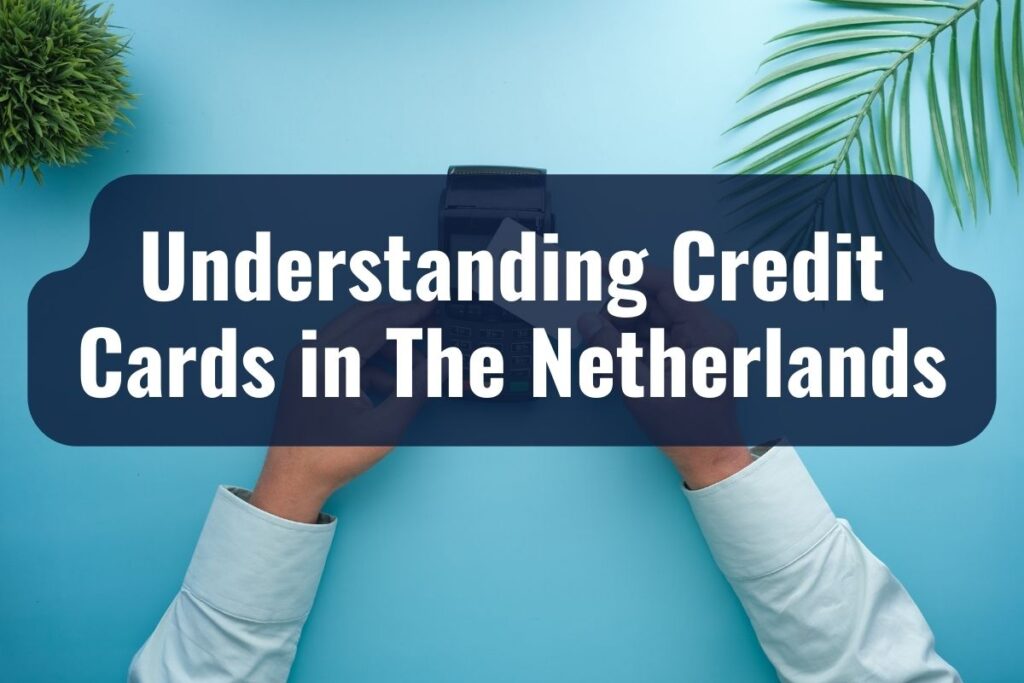Understanding the process of acquiring a credit card in the Netherlands can seem daunting for newcomers and residents alike. This guide aims to simplify the journey, breaking down the essential steps and requirements.
Whether you’re looking to manage daily expenses, build credit, or facilitate international transactions, understanding how to get a credit card in the Netherlands is key.
Key Takeaways:
- Acquiring a credit card in the Netherlands is systematic, requiring legal residency and income proof.
- Using credit responsibly, in line with local ethos, can lead to a stress-free financial journey.
- The Netherlands offers diverse payment alternatives, from pinpassen to mobile apps.
- Continuous learning and consultation with financial professionals ensures up-to-date financial decisions.
Understanding Credit Cards in The Netherlands

Venturing into the world of Dutch credit cards might initially seem like deciphering a complex puzzle. However, once you’re equipped with the right knowledge, it quickly transforms into a user-friendly tool tailored for convenience. Here, we demystify the credit card terrain in the Netherlands, ensuring you’re well-prepared to engage with it confidently.
Popularity of Credit Cards vs. Debit Cards
In the Netherlands, while credit cards are widely accepted, they aren’t the primary mode of payment for everyday transactions. The Dutch predominantly use debit cards, such as the pinpas, for their day-to-day expenses, from buying groceries to settling cafe bills. This is partly due to the local preference for direct payment methods and the country’s efficient electronic payment infrastructure. However, for international online purchases, hotel bookings, and car rentals, credit cards are often preferred, if not necessary.
Key Features of Dutch Credit Cards
Dutch credit cards, at their core, share many similarities with those from other countries. However, there are nuances to be aware of:
Safety Measures: Cards usually come embedded with EMV chips, making transactions secure. Additionally, many providers require a PIN for both online and offline transactions, adding an extra layer of safety.
Rewards and Benefits: While reward programs might not be as expansive as in some countries, many Dutch credit cards still offer loyalty points, travel insurance, or cashback opportunities.
Interest Rates and Fees: It’s essential to be mindful of the associated costs. Dutch credit cards can have higher annual fees and interest rates compared to their debit counterparts. Always read the fine print to understand the full cost of borrowing.
Why Understanding the Credit Card System is Essential for Expats
For an expat, a credit card can be more than just a payment tool. It can be instrumental in building a credit history in the Netherlands. Especially if you plan to reside long-term or consider financial moves like buying property, a healthy credit standing is invaluable. Furthermore, for international transactions or emergencies, having a credit card ensures you’re never caught off guard.
Acquiring a Credit Card as an Expat
Navigating the pathways of obtaining a credit card in a new country can often seem like a daunting journey. But with a touch of guidance and a sprinkle of clarity, this path becomes not only manageable but also empowering. Here’s your roadmap to acquiring a credit card in the Netherlands, tailored to meet the nuances of an expat’s life.
Eligibility Criteria
The door to Dutch credit cards isn’t a mysterious one. Here’s what you generally need to unlock it:
Residency Status
Whether you’re a student, working professional, or a long-term tourist, you typically need to have a legal residence status in the Netherlands. This often means having a valid residence permit or documentation showcasing your stay’s legality.
Income Thresholds
Banks and credit institutions want to ensure that you can pay back any borrowed amount. Hence, there might be minimum income requirements, which can vary between institutions. For students or those without a steady income, there might be specific cards with lower limits or special provisions.
Credit History
While having a Dutch credit history can be advantageous, it’s not always mandatory. Some banks might consider your credit history from your home country, especially if you’re using international banking services. However, remember that starting with a clean slate also offers an opportunity to build a strong credit history in the Netherlands.
The Application Process
Embarking on your credit card acquisition journey? Here’s what to expect:
Necessary Documentation
Typically, you’ll need to provide identification (like your passport), proof of residency (a rental contract or utility bill), a recent payslip, or proof of income. For non-EU nationals, a residence permit might also be necessary.
Steps to Apply
Many Dutch banks offer an online application process, making it convenient for you. Once you’ve selected your desired card and gathered the necessary documents, the application usually involves filling out an online form, uploading documents, and awaiting approval. Some banks might also offer face-to-face consultations, especially for specialized expat services.
Special Credit Cards Tailored for Expats and International Students
Recognizing the unique financial needs of expats and international students, several Dutch banks offer specialized credit cards. These might come with benefits like multi-currency features, global emergency services, or travel perks. It’s worth exploring these tailored options, ensuring your credit card aligns seamlessly with your international lifestyle.
Popular Credit Cards in the Netherlands
In the Netherlands, several credit cards stand out for their widespread acceptance and array of benefits. These include cards from major international providers like Visa, Mastercard, and American Express, as well as offerings from local banks.
Visa and Mastercard are globally recognized, ensuring ease of use both domestically and abroad. They are accepted in a vast number of establishments, from supermarkets to upscale restaurants. Additionally, these cards often come with travel insurance and purchase protection benefits, enhancing their appeal to a wide range of users.
American Express, though slightly less widespread in acceptance, compensates with a generous rewards program. Users can accumulate points for flights, hotel stays, and more, making it a favorite among frequent travelers.
Local banks also offer credit cards tailored to the needs of Dutch residents. These cards are designed with local spending habits in mind, offering cashback on groceries, fuel, and other daily expenses. Some also include unique features like sustainable spending rewards or discounts on cultural events.
Choosing the right card depends on your lifestyle, spending habits, and financial goals. It’s essential to compare the fees, benefits, and rewards programs to find the best fit for your needs.
Using Your Credit Card Wisely

In the Netherlands, the ethos surrounding credit has always been one of prudence and mindfulness. As an expat, merging this local wisdom with your own financial habits can lead to a harmonious and stress-free financial journey. Let’s delve into the art of using your credit card judiciously in the Dutch landscape.
The Dutch Approach to Credit and Debt
The Netherlands, historically and culturally, has a conservative stance towards borrowing. It’s seen less as a lifestyle enabler and more as a tool for specific purposes. Gezellig, a Dutch term that encompasses the heart of their culture – coziness, togetherness, and contentment – can be a guidepost. It reminds one to live within their means, finding joy in simplicity. Embracing this perspective can help you align with the local financial ethos and ensure you stay clear of unwanted debt.
Common Credit Card Pitfalls to Avoid
Even with the best intentions, one might occasionally stumble. Here are some areas to be cautious about:
- Overborrowing: Just because there’s available credit doesn’t mean it’s free money. Regularly maxing out your card can lead to hefty interest payments and affect your credit score.
- Late payments: Consistently paying your credit card bills on time is not just good for your pocket (avoiding late fees) but also vital for maintaining a healthy credit history in the Netherlands.
- Understanding interest rates: Dutch credit cards can sometimes have higher interest rates compared to some other countries. Always be aware of the rate you’re being charged, especially if you’re not paying off the full balance every month.
Tips for Maintaining a Healthy Credit Score in the Netherlands
Your credit score is like a financial passport, opening doors to various opportunities. Here’s how to keep it in tip-top shape:
- Regularly monitor: Check your credit statement regularly for any discrepancies or unknown transactions.
- Limit frequent credit requests: Each time you apply for credit, it can leave a mark on your credit report. Multiple applications in a short span can signal financial distress to lenders.
- Stay below your credit limit: Regularly maxing out can be a red flag. It’s advisable to use a portion of your available credit and pay it off promptly.
Related: Dutch Currency: Understanding Money in the Netherlands
Alternatives to Credit Cards
The financial tapestry of the Netherlands, while inclusive of credit cards, is woven with a variety of other payment options. This rich mosaic ensures that whether it’s personal preference, a desire to manage finances differently, or the need for a simpler solution, there’s something for everyone. Here, we shine a light on the viable alternatives to credit cards, empowering you with choices that resonate with your financial journey in the Netherlands.
| Alternative | Description |
| Debit Cards (pinpassen) | Direct access to bank funds; widely accepted and often come with contactless technology. |
| iDEAL | Trusted online payment system integrated with Dutch banking; favored for online shopping. |
| Mobile Payment Apps | Digital solutions for easy transactions; apps like Tikkie popular for peer-to-peer payments. |
| Prepaid Cards | Cards loaded with specific amounts; act like debit cards without a direct bank link. |
| Bank Transfers | Efficient and often instant; common for rent payments and salary credits. |
Debit Cards (pinpassen)
Perhaps the most ubiquitous financial tool in the Dutch realm, debit cards, or pinpassen as they’re locally known, allow direct access to your bank funds. They’re widely accepted, from quaint local bakeries to bustling shopping centers.
Direct payments: One of their hallmarks is that they facilitate immediate transactions, deducting the amount from your bank account.
Contactless Payments: Many modern debit cards in the Netherlands are equipped with contactless payment technology, making small purchases swift and hassle-free.
iDEAL
A beloved and trusted payment system in the Netherlands, iDEAL seamlessly integrates with online banking. It’s particularly popular for online shopping, bill payments, and even charitable donations.
Safety: Transactions via iDEAL are conducted within the security protocols of your bank’s online platform.
Integration with e-commerce: Most Dutch e-commerce platforms offer iDEAL as a preferred payment method due to its speed and reliability.
Mobile Payment Apps
The digital wave has ushered in an era of convenient mobile payment apps, and the Netherlands is no stranger to this trend. Apps like Tikkie, a peer-to-peer payment request system, have become integral to social outings and group expenses.
Prepaid Cards
For those who prefer the convenience of a card but wish to bypass the trappings of credit, prepaid cards offer a middle ground. These cards can be loaded with a specific amount and then used similarly to credit or debit cards. They’re particularly useful for managing budgets or for those without a local bank account.
Bank Transfers
With advanced digital banking infrastructure, bank-to-bank transfers in the Netherlands are efficient and often instantaneous. They’re commonly used for rent payments, salary credits, and more.
Essential Takeaways for Expats

As the sun sets on our deep dive into the world of credit cards and their alternatives in the Netherlands, let’s pause to reflect on the essential pearls of wisdom we’ve gathered. These nuggets, specifically tailored for the expat community, will not only aid in making informed decisions but also offer a reassuring touchstone as you navigate the Dutch financial waters.
Melding with the Local Financial Ethos: The Netherlands has its unique approach to finances – one that merges practicality with a touch of conservatism. It’s worthwhile for expats to acquaint themselves with and respect this local approach, finding a balance between their personal financial style and Dutch sensibilities.
Credit as a Tool, Not a Crutch: While credit cards are available and can be incredibly useful, especially for international needs, it’s essential to view them as tools. They offer convenience and flexibility, but their judicious use is crucial to avoid potential pitfalls.
Explore Tailored Expat Solutions: Several Dutch financial institutions recognize the unique needs of the expat community and offer solutions catering specifically to them. Whether it’s a specialized credit card or banking service, these tailored offerings can make the transition smoother and more intuitive.
Embrace Alternatives: The Dutch financial landscape is abundant with alternatives to credit cards, from the ubiquitous pinpas to the trusted iDEAL system. Being open to these options can often lead to simpler, more efficient financial management.
Continuous Learning is Key: The financial world is dynamic, with ever-evolving products, services, and trends. Staying updated, asking questions, and seeking advice when needed will ensure you’re always on the front foot.
Building and Maintaining a Good Credit History: If you decide to go down the credit route, remember that maintaining a healthy credit history in the Netherlands is invaluable, especially if you have long-term plans in the country. Timely repayments and responsible borrowing are foundational.
Related: Cost of Living in the Netherlands: A Complete 2026 Guide